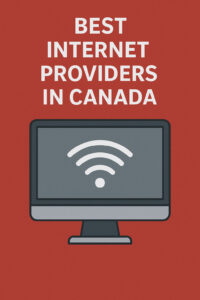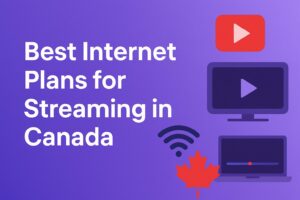Understanding Internet Speed Requirements in Canada
From working at home to streaming in 4K or gaming online, the right internet speed makes all the difference. In Canada, internet quality and availability vary widely between regions and providers. That means choosing the right plan starts with understanding how much speed you actually need. This guide explains internet speed basics, outlines requirements for work, streaming, and gaming, and shows you how to select a plan that fits your household size and digital lifestyle.
What Is Internet Speed and How Is It Measured?
Internet speed is the rate at which data moves between the internet and your devices. It is measured in megabits per second (Mbps) and has two key parts:
- Download speed: How quickly you receive data such as streaming a movie or opening a webpage.
- Upload speed: How fast you send data, like uploading files or sharing videos.
Another factor is latency (ping), the delay in data transfer. Low latency is essential for activities like video calls and online gaming.
Internet Speed for Remote Work
As more Canadians work remotely, a reliable connection is vital. Here are minimum speed requirements by task:
| Work Activity | Download | Upload |
|---|---|---|
| Email, Browsing | 1-5 Mbps | 0.5-1 Mbps |
| Video Calls (Zoom/Teams) | 5-10 Mbps | 2-5 Mbps |
| File Sharing | 10-25 Mbps | 5-10 Mbps |
| Cloud Tools (Google Workspace, O365) | 15-25 Mbps | 5-10 Mbps |
If multiple people are working or studying at home, aim for 100 Mbps or higher to keep performance smooth.
Internet Speed for Streaming
Streaming platforms have specific bandwidth requirements. Here are the basics:
| Quality | Download Speed |
|---|---|
| SD | 3-4 Mbps |
| HD (720p/1080p) | 5-8 Mbps |
| Ultra HD / 4K | 25 Mbps+ |
These are per device. Two people streaming Netflix in 4K plus a video call requires far more than 25 Mbps.
- Netflix: 3 Mbps (SD), 5 Mbps (HD), 15 Mbps (4K)
- Disney+ / Prime Video: 5–25 Mbps
- YouTube: 2.5 Mbps (HD), 20 Mbps (4K)
Internet Speed for Gaming
Gamers need not just speed, but also low latency and minimal packet loss. Below are general recommendations:
| Gaming Type | Download | Upload | Ping |
|---|---|---|---|
| Casual | 5-10 Mbps | 1-3 Mbps | <100 ms |
| Competitive / FPS | 15-25 Mbps | 3-5 Mbps | <30 ms |
| Cloud Gaming | 25-50 Mbps | 10 Mbps | <20 ms |
For smoother gameplay, a wired Ethernet connection is more reliable than Wi-Fi.
Household Internet Needs
- 1-2 users, light use: 25-50 Mbps
- 3-4 users, mixed use: 100-200 Mbps
- 5+ users, heavy use: 300-500 Mbps+
If you have a smart home with connected devices, a fiber plan of 1 Gbps or higher is best.
Checking Your Internet Speed
Use tools like Speedtest.net or Fast.com to test speeds at different times of day. If results are far below your plan, consider a better router, fewer devices connected, or switching providers.
Recommended Speeds by User Type
| User Type | Recommended Speed |
|---|---|
| Students | 25-50 Mbps |
| Remote Workers | 50-100 Mbps |
| 4K Streamers | 150-300 Mbps |
| Gamers | 100-300 Mbps + low ping |
| Smart Homes | 500 Mbps – 1 Gbps |
Choosing the Right Internet Plan
- Go slightly higher: Peak hours can slow connections.
- Unlimited data: Critical for streamers and gamers.
- Fiber if available: Faster and more reliable.
- Compare providers: Use Findhub.ca to compare internet plans in your area.
Best Internet Providers in Canada
Top providers offering high-speed internet across Canada include:
- Diallog Internet: Affordable plans, great for students and small households.
- Bell Fibe: Fiber speeds up to 3 Gbps, excellent for 4K streaming.
- Telus PureFibre: Symmetrical speeds ideal for work-from-home users.
- Rogers Ignite: Widely available, good bundle options.
- Coextro & VMedia: Budget-friendly alternatives for urban areas.
Coverage and speeds vary by province. Always compare using your postal code before subscribing.
Final Thoughts
The best internet plan is the one that matches your actual usage. Count your devices, factor in work, streaming, and gaming needs, and choose a provider that offers enough speed with reliable service.






